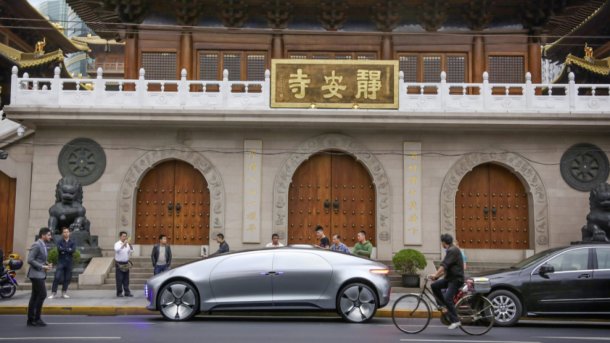Chinese automaker Baidu: next-level search engine
Tech giant Baidu is viewed as a leader in the development of autonomous driving. All German manufacturers are cooperating with it. That's not entirely harmless.

(Bild: Mercedes)
- Christian Domke Seidel
(Hier finden Sie die deutsche Version des Beitrags)
Episode eight of a ten-part series in which heise/Autos looks at the Chinese car market. There, Chinese electric car producers - some of them strongly supported by the so-called Communist Party - are just warming up in order to soon roll up the local and international markets with a lot of momentum and a colorful bouquet of state-of-the-art cars. This is likely to have consequences for German car manufacturers, whose largest single global market has been China for several years.
On the one hand, this will foreseeably change the picture on German and European roads, but it will also have repercussions for German producers and their sales in China, the world's largest single market.
Baidu is what Google is in this country. It is China's largest search engine and is one of the three most frequently accessed websites in the world. The group's digital universe includes a platform similar to Wikipedia, a map service, cloud storage services, and a content sharing platform and video portal. All of this funds extensive research and development in the field of autonomous driving. The tech giant is considered a world leader in this field.
Baidu has many partners
In 2013, Baidu began developing a self-driving car. Around 1,000 developers and fifty partners, including BMW and Mercedes, participated on an open platform. Four years later, Baidu joined forces with some of the partners to form the "Apolong" or "Apollo" project.
The goal is to develop a car at level 4. In other words, highly automated. The system will permanently take over the control of the vehicle, and the driver can only be asked to intervene if the car is overtaxed.
(Bild: Baidu)
From search engine to car manufacturer
The result of this development has been on display since the summer of 2022. Together with the Chinese car giant Geely (including Volvo and a 20 percent stake in Mercedes), Baidu has founded the start-up Jidu Auto. Smart electric cars are to be built under this name. The first was the limited Robo-01 Lunar Edition.
Videos by heise
Generally speaking, the vehicle looks impressive. The 4.85 meter long SUV with swan doors at the front has a 36.5-inch monitor that stretches across the entire width of the interior. Customers can buy the car for an almost sensational $55,000 . What's important, however, is what you don't see at first glance: Five radar eyes, two lidar sensors and twelve HD cameras. The SUV is said to be capable of Level 4.
Level 4 soon in large-scale production
But the Lunar Edition is just a forerunner. The vehicle is scheduled to go into mass production next year, or in 2024 at the latest. Whether the name Robo-01 will be retained will depend on how the limited edition performs in practice. The mass-produced car is expected to cost less than 30,000 euros, although, as Jidu announced, it will be 90 percent identical to the Lunar Edition.
Baidu's lead in autonomous driving is not surprising. After all, the group is already allowed to operate robo-taxis in selected cities. By 2025, the so-called Apollo Go fleet will already include 1000 self-driving cars operating in 65 cities. So far, Baidu has been able to collect data from 20 million kilometers driven to train the algorithm. The goal is to be able to offer a vehicle at level 5 in the foreseeable future.
(Bild: N509FZ (CC BY-SA 4.0))
The open platform and the lead in this technology is also the reason why a majority of the vehicles are equipped with Baidu technology. BYD and NIO work with the tech giant, as well as BMW, Mercedes, and Volkswagen. The problem is that while Baidu started out as a kind of supplier of software, it now offers electric vehicles itself and has become a competitor.
Baidu and the Communist Party
A partnership with Baidu therefore carries a certain risk for Western manufacturers. In addition to the protection of data and know-how, there is also the fact that Baidu is very close to the Chinese government. For the Communist Party, the Internet is a tool for spreading favorable news and censoring undesirable ones. Baidu, for example, does not show results from foreign homepages. And the results of Chinese sites are also censored - even though their contents were already checked when they were published.
Baidu gained some recognition in the West because the labor camps in Xinjiang were (unintentionally) uncovered with the help of very obvious censorship. In order to keep internment camps, prisons, but also military bases and critical infrastructure secret, the Chinese government had the map material censored. Where corresponding facilities are, blank tiles suddenly appeared. When evaluating the human rights situation, journalists therefore focused on the tiles and discovered 315 internment camps.
(Bild: Mercedes )
Politically problematic
The Mercator Institute for China Studies (Merics) explicitly points out that the political situation in China could become a problem for European car manufacturers. When Russia began its war of aggression in Ukraine and sanctions kicked in, Renault had to sell its Russian business to Avtovaz for a symbolic ruble. The French sold a whopping 18 percent of their new cars there. In China, manufacturers face a similar scenario. China's dealings with Hong Kong, Taiwan and the Muslim minority of the Uyghurs could lead to similar situations.
(fpi)